- Home
- Lauren Oliver
Delirium dt-1 Page 5
Delirium dt-1 Read online
Page 5
Every so often people make mistakes; it’s biological, a result of the same kind of chemical and hormonal imbalances that occasionally lead to Unnaturalism, to boys being attracted to boys and girls to girls. These impulses, too, will be resolved by the cure.
But this time it is serious, apparently, and Hana drops the bomb just as we turn onto Center: Mr. and Mrs. Marks have agreed to move the date of Willow’s procedure up by a full six months. She’ll be missing graduation day to get cured.
“Six months?” I repeat. We’ve been running hard for twenty minutes, so I’m not sure if the heavy thumping in my chest is a result of the exercise or the news.
I’m feeling more out of breath than I should be, like someone’s sitting on my chest. “Isn’t that dangerous?”
Hana tips her head to the right, gesturing the way to a shortcut through an alley. “It’s been done before.”
“Yeah, but not successfully. What about all the side effects? Mental problems? Blindness?” There are a few reasons why the scientists won’t let anyone under the age of eighteen have the procedure, but the biggest one is that it just doesn’t seem to work as well for people younger than that, and in the worst cases it’s been known to cause all kind of crazy problems. Scientists speculate that the brain and its neuro-pathways are still too plastic before then, still in the middle of forming themselves. Actually, the older you are when you have the procedure, the better, but most people are scheduled for the procedure as close as possible to their eighteenth birthday.
“I guess they think it’s worth the risk,” Hana says. “Better than the alternative, you know? Amor deliria nervosa. The deadliest of all deadly things.”
This is the catchphrase that’s written on every mental health pamphlet ever written about the deliria; Hana’s voice is flat as she repeats it, and it makes my stomach dip. All of yesterday’s craziness has made me forget Hana’s comment to me before the evaluations. But now I remember, and remember how strange she looked too, eyes cloudy and unreadable.
“Come on.” I feel a straining in my lungs and my left thigh is starting to cramp. The only way to push through it is to run harder and faster. “Let’s pick it up, Slug.”
“Bring it.” Hana’s face splits into a grin, and both of us start pumping faster.
The pain in my lungs swells up and blossoms until it feels like it’s everywhere, tearing through all my cells and muscles at once. The cramp in my leg makes me wince every time my heel hits the pavement. It’s always like this on miles two and three, like all the stress and anxiety and irritation and fear get transformed into little needling points of physical pain, and you can’t breathe or imagine going farther or think anything but: I can’t. I can’t. I can’t.
And then, just as suddenly, it’s gone. All the pain lifts away, the cramp vanishes, the fist eases off my chest, and I can breathe easily. Instantly a feeling of total happiness bubbles up inside of me: the solid feeling of the ground underneath me, the simplicity of the movement, rocketing off my heels, pushing forward in time and space, total freedom and release. I glance over at Hana. I can tell from her expression that she’s feeling it too. She has made it through the wall.
She senses me looking and whips around, her blond ponytail a bright arc, to give me the thumbs-up.
It’s strange. When we run I feel closer to Hana than at any other time. Even when we’re not talking, it’s like there’s an invisible cord tethering us together, matching our rhythms, our arms and our legs, as though we’re both responding to the same drumbeat. More and more it has been occurring to me that this, too, will change after our procedures. She’ll retreat to the West End and make friends with her neighbors, with people richer and more sophisticated than I am. I’ll stay in some crappy apartment on Cumberland, and I won’t miss her, or remember what it felt like to run side by side. They’ve warned me that after my procedure I may not even like running anymore, period. Another side effect of the cure: People often change their habits afterward, lose interest in their former hobbies and things that had given them pleasure.
“The cured, incapable of strong desire, are thus rid of both remembered and future pain” (“After the Procedure,” The Safety, Health, and Happiness Handbook, p. 132).
The world is spinning by, people and streets a long, unfurling ribbon of color and sound. We run past St. Vincent’s, the biggest all-boys school in Portland. A half-dozen boys are outside playing basketball, lazily dribbling the ball around, calling to one another. Their words are a blur, an indistinct series of shouts and barks and short bursts of laughter, the way that boys always sound whenever they’re together in groups, whenever you only hear them from around corners or across streets or down the beach. It’s like they have a language all their own, and for about the thousandth time I think how glad I am that segregation policies keep us separate most of the time.
As we run by I think I sense a momentary pause, a fraction of a second when all their eyes lift and turn in our direction. I’m too embarrassed to look. My whole body goes white-hot, like someone’s just stuck me headfirst into an oven.
But a second later I feel their eyes sweeping past me, a wind, latching on to Hana.
Her blond hair flashes next to me, a coin in the sun.
The pain is creeping back into my legs, a leaden feeling, but I force myself to keep going as we round the corner of Commercial Street and leave St. Vincent’s behind. I feel Hana straining to keep up next to me. I turn my head, barely managing to gasp out, “Race you.” But as Hana pulls up, arms pumping, and nearly passes me, I put my head down and lunge forward, cycling my legs as fast as I can, trying to suck air into my lungs, which feel like they’ve shrunk to the size of a pea, fighting the screaming in my muscles. Blackness eats the edges of my vision, and all I can see is the chain-link fence that rises up in front of us suddenly, blocking our path, and then I’m reaching out and thwacking it so hard it begins to shake, turning around to yell, “I won!” as Hana pulls up a second behind me, gasping for breath. Both of us are laughing now, hiccuping and taking huge gulping breaths of air as we pace around in circles, trying to walk it off.
When she can finally breathe again, Hana straightens up, laughing. “I let you win,” she says, an old joke of ours.
I toe some gravel in her direction. She ducks away, shrieking. “Keep telling yourself that.”
My hair has come out of its ponytail and I wrestle it out of its elastic, flipping my head down so I get the wind on my neck. Sweat drips down into my eyes, stinging.
“Nice look.” Hana pushes me lightly and I stumble sideways, whipping my head up to swipe back at her.
She sidesteps me. There’s a gap in the chain-link fence that marks the beginning of a narrow service road. This is blocked with a low metal gate. Hana hops it and gestures for me to follow. I haven’t really been paying attention to where we are: The service drive threads down through a parking lot, a forest of industrial Dumpsters and cargo storage sheds. Beyond those is the familiar string of white square buildings, like giant teeth. This must be one of the side entrances of the lab complex. I see now that the chain-link fence is looped on top with barbed wire and marked at twenty-foot intervals with signs that all read: PRIVATE PROPERTY. NO TRESPASSING. AUTHORIZED PERSONNEL ONLY.
“I don’t think we’re supposed to—” I start to say, but Hana cuts me off.
“Come on,” she calls out. “Live a little.”
I do a quick scan of the parking lot beyond the gate and the road behind us: no one. The small guard hut just past the gate is also empty. I lean over and peek inside. There’s a half-eaten sandwich sitting on wax paper, and a stack of books piled messily on a small desk next to an old-fashioned radio, which is spitting static and patchy bits of music into the silence. I don’t see any surveillance cameras, either, though there must be some. All the government buildings are wired. I hesitate for a second longer, then swing myself over the gate and catch up to Hana. Her eyes are lit up with excitement, and I can tell that this was her plan, and
her destination, all along.
“This must be how the Invalids got in,” she says in a breathless rush, as though we’ve been talking about yesterday’s drama at the labs all this time.
“Don’t you think?”
“Doesn’t seem like it would have been hard.” I’m trying to sound casual but the whole thing—the empty service road and the enormous parking lot, shimmering in the sun, the blue Dumpsters and the electrical wires zigzagging across the sky, the sparkling white slope of the lab roofs—makes me uneasy.
Everything is silent and very still—frozen, almost, the way things are in a dream, or just before a major thunderstorm. I don’t want to say it to Hana, but I’d give pretty much anything to head back to Old Port, to the complex nest of familiar streets and stores.
Even though there’s no one around, I have the impression of being watched.
It’s worse than the normal feeling of being observed in school and on the street and even at home, having to be cautious about what you do and say, the close, blocked-in feeling that everyone gets used to eventually.
“Yeah.” Hana kicks at the packed dirt road. A plume of dust puffs up, resettles slowly. “Pretty crappy security for a major medical facility.”
“Pretty crappy security for a petting zoo,” I say.
“I resent that.” The voice comes from behind us, and both Hana and I jump.
I spin around. The world seems to freeze for an instant.
A boy is standing behind us, arms crossed, head cocked to the side. A boy with caramel-colored skin and hair that’s a golden-brown color, like autumn leaves getting ready to fall.
It’s him. The boy from yesterday, from the observation deck. The Invalid.
Except he isn’t an Invalid, obviously. He’s wearing a short-sleeved blue guard’s uniform over jeans, and he’s got a laminated government ID clipped to his collar.
“I leave for two seconds to get a refill”—he gestures to the bottle of water he’s holding—“and I come back to find a full-fledged break-in.”
I’m so confused I can’t move or speak or do anything. Hana must think I’m scared, because she jumps in quickly, “We weren’t breaking in. We weren’t doing anything. We were just running and we… um, we got lost.”
The boy crosses his arms in front of his chest, rocking back on his heels.
“Didn’t see any of the signs outside, huh? ‘No Trespassing’? ‘Authorized Personnel Only’?”
Hana looks away. She’s nervous too. I can feel it. Hana’s a thousand times more confident than I am, but neither of us is used to standing in the open and talking to a boy, especially not a boy-guard, and it must have occurred to Hana that he already has plenty of grounds to arrest us.
“Must have missed them,” she mumbles.
“Uh-huh.” He raises his eyebrows. It’s obvious he doesn’t believe us, but at least he doesn’t look angry. “They’re pretty subtle. Only a few dozen of them. I can see how you might not have noticed.”
He looks away for a second, squinting, and I get the feeling he’s trying to stop himself from laughing. He’s not like any guard I’ve ever seen—at least, not the typical guards you see at the border and all around Portland, fat and scowly and old. I think about how sure I was yesterday that he came from the Wilds, the solid certainty deep inside of me.
I was wrong, obviously. As he turns his head I see the unmistakable sign of someone who is cured: the mark of the procedure, a three-pointed scar just behind the left ear, where the scientists insert a special three-pronged needle used exclusively for immobilizing the patient so that the cure can be administered.
People show off their scars like badges of honor; you hardly see any cureds with long hair, and the women who haven’t lopped off their hair entirely are careful to wear it pulled back.
My fear recedes. Talking to a cured isn’t illegal. The rules of segregation don’t apply.
I’m not sure if he has recognized me or not. If so, he hasn’t given any sign of it. Finally I can’t take it anymore and I burst out, “You. I saw you—” At the last second I can’t finish the sentence. I saw you yesterday.
You winked at me.
Hana looks startled. “You two know each other?” She shoots a look at me.
Hana knows I’ve hardly ever exchanged two words with a boy before, unless it’s
“Excuse me” in the street or “Sorry for stepping on your toes” when I trip on somebody. We’re not supposed to have more than minimal contact with uncured boys outside of our own families. Even after they’ve been cured, there’s hardly a need or excuse for it, unless we’re dealing with a doctor or teacher or someone like that.
He turns to look at me. His face is completely professional and composed, but I swear I see something flickering in his eyes, a look of amusement or pleasure. “No,” he says smoothly. “We’ve never met. I’m sure I would remember.” The flash in his eyes is back—is he laughing at me?
“I’m Hana,” Hana says. “And this is Lena.” She jabs me with an elbow. I know I must look like a fish, standing there with my mouth gaping open, but I’m too outraged to speak. He’s lying. I know he’s the one I saw yesterday, would bet my life on it.
“Alex. Nice to meet you.” Alex keeps his eyes on me as he and Hana shake hands. Then he extends a hand to me. “Lena,” he says thoughtfully. “I’ve never heard that name before.”
I hesitate. Shaking hands makes me feel awkward, like I’m playing dress-up in an adult’s too-big clothing. Besides, I’ve never actually touched skin-to-skin with a stranger. But he’s just standing there with his hand out, so after a second I reach out and shake. The moment we touch, a tiny electrical shock buzzes through me, and I pull away quickly.
“It’s short for Magdalena,” I say.
“Magdalena.” Alex tips his head back, watching me from narrowed eyes.
“Pretty.”
I’m momentarily distracted by the way he says my name. In his mouth it sounds musical, not clunky and angular, the way my teachers have always made it sound. His eyes are a warm amber color, and as I look at him I have a sudden, flashing memory of my mother pouring syrup over a stack of pancakes. I look away, feeling ashamed, as though he has somehow been responsible for dredging the memory up, has reached in with his hand and wrenched it from me.
Embarrassment makes me feel angry, and I press on, “I do know you. I saw you yesterday in the labs. You were on the observation deck, watching—watching everything.” Again, my courage fails me at the last second and I don’t say, Watching me.
I can feel Hana glaring at me, but I ignore her. She must be furious I haven’t told her any of this.
Alex’s face doesn’t change. He doesn’t blink or drop his smile for even a fraction of a second. “Case of mistaken identity, I guess. Guards aren’t allowed in the labs during evaluations. Especially not part-time guards.”
For a second longer we stand there, staring at each other. Now I know he’s lying, and the easy, lazy grin on his face makes me want to reach out and slap him. I ball my fists and suck in a deep breath, willing myself to stay calm. I’m not the violent type. I don’t know why I’m feeling so aggravated.
Hana jumps in, breaking the tension. “So this is it? A part-time security guard and some ‘Keep Out’ signs?”
Alex keeps his eyes on me a half second longer. Then he turns to look at Hana as though noticing her for the first time. “What do you mean?”
“I would have thought the labs would be better protected, that’s all. It doesn’t seem like it would be too hard to break into this place.”
Alex raises his eyebrows. “Thinking about making the attempt?”
Hana freezes, and my blood goes to ice. She has gone too far. If Alex reports us as potential sympathizers, or troublemakers, or anything, we’re in for months and months of surveillance and investigation—and we can kiss our chances of passing the evaluations with decent scores good-bye. I picture a lifetime of watching Andrew Marcus fish snot out of his nose with a thumbnai
l and feel queasy.
Alex must sense our fear, because he raises both hands. “Relax. I was kidding. You don’t exactly seem like terrorists.” It occurs to me how ridiculous we must look in our running shorts and sweaty tank tops and neon sneakers. Or at least, I must look ridiculous. Hana looks like a model for athletic wear. Again, I feel a fit of blushing coming on, followed by a surge of irritation. No wonder the regulators decided on the segregation of boys and girls: Otherwise, it would have been a nightmare, this feeling angry and self-conscious and confused and annoyed all the time.
“This is just the loading area, anyway, for freight and stuff.” Alex gestures beyond the line of cargo sheds. “Real security starts closer to the facilities. Full-time guards, cameras, electrified fence, the whole shebang.”
Hana doesn’t look at me, but when she speaks I can hear the excitement creeping into her voice. “The loading area? Like, where the deliveries come?”
In my head I start praying, Don’t say anything dumb. Don’t say anything dumb. Do not mention the Invalids.
“You got it.”
Hana dances on her feet, shifting her weight back and forth. I try to shoot her a warning look, but she avoids my eyes.
“So this is where the trucks come? With medical equipment and… and other stuff?”
“Exactly.” Again I have the impression of something flickering behind Alex’s eyes, even as the rest of his face stays totally neutral. I don’t trust him, I realize, and again wonder why he is lying about being in the labs yesterday.
Maybe only because it’s forbidden, like he said. Maybe because he was laughing instead of trying to help out.
And maybe, after all, he really doesn’t recognize me. We made eye contact for only a few seconds, and I’m sure to him I was only a blurry, in-between face, easy to forget. Not pretty. Not ugly, either. Just plain, like a thousand other faces you would see on the street.

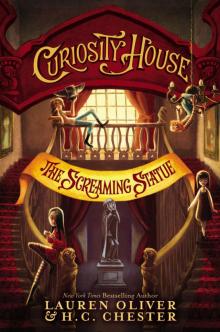 The Screaming Statue
The Screaming Statue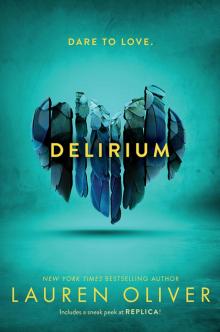 Delirium
Delirium Before I Fall
Before I Fall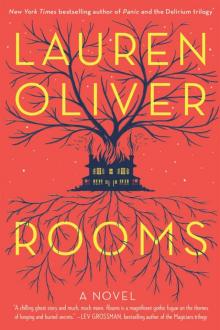 Rooms
Rooms Replica
Replica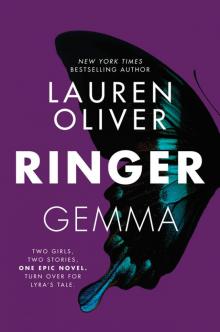 Ringer
Ringer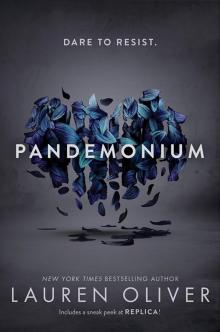 Pandemonium
Pandemonium The Shrunken Head
The Shrunken Head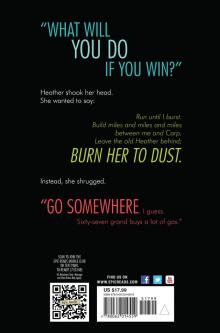 Panic
Panic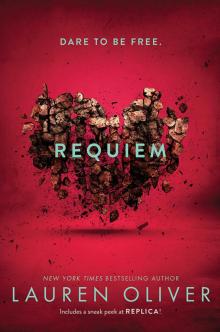 Requiem
Requiem The Spindlers
The Spindlers Annabel
Annabel Liesl & Po
Liesl & Po Raven
Raven Alex
Alex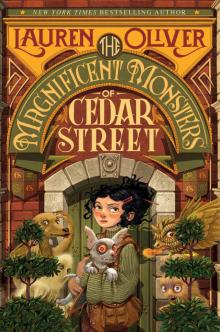 The Magnificent Monsters of Cedar Street
The Magnificent Monsters of Cedar Street Vanishing Girls
Vanishing Girls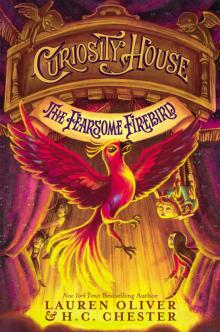 The Fearsome Firebird
The Fearsome Firebird Raven: A Delirium Short Story
Raven: A Delirium Short Story Annabel: A Delirium Short Story
Annabel: A Delirium Short Story Hana: A Delirium Short Story
Hana: A Delirium Short Story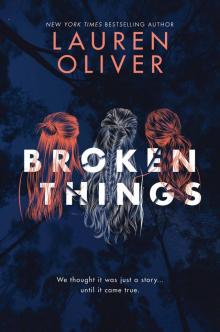 Broken Things
Broken Things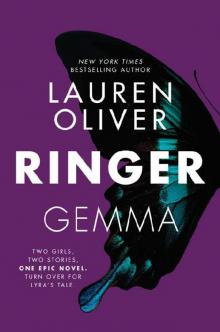 Ringer (Replica)
Ringer (Replica) Alex (delirium)
Alex (delirium)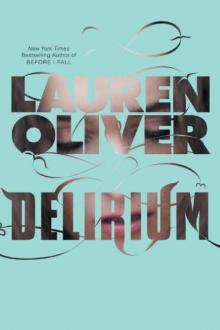 Delirium dt-1
Delirium dt-1